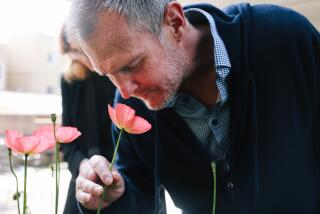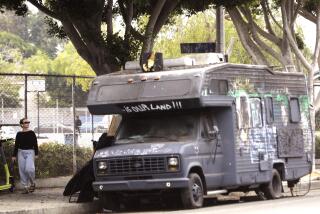Douglas Helping Displaced Workers Get Back on Track : Workplace: An eight-week program assists victims of reorganizations in patching up battered egos. That often includes a trip to the wilderness.
- Share via
Joe Brazil spent 25 years climbing up the corporate ladder at Douglas Aircraft, only to be pushed off.
Brazil, a former telecommunications director, was the victim of a corporate upheaval at the Long Beach-based aerospace firm. Layers of Douglas management were stripped away last spring, and 274 senior executives like Brazil ended up competing for 74 remaining slots. Brazil lost out and was told to apply for lower-level jobs.
“I felt no reason to start out at the bottom someplace else,” said Brazil, 51. “A great deal of your status in life is tied to your job. I felt that my self-esteem had been taken away. I felt very bad.”
But instead of quitting, Brazil and more than a dozen other Douglas executives have participated in a company-sponsored program designed to patch up battered egos and help managers plan the next step in their personal and professional lives.
The eight-week program, designed for Douglas by Business Life Transitions, a Seal Beach-based career management consulting firm, included career and financial planning, treks into the wilderness and heavy doses of self-analysis.
Career counseling and Outward Bound outdoor experiences are nothing new in the corporate world. But the Douglas program is unusual in that it bundles various such activities into one package for displaced workers.
Business Life Transitions was brought in after Douglas Aircraft’s corporate parent, St. Louis-based McDonnell Douglas, mastered a sweeping reorganization of the firm and its culture to boost teamwork, quality and profits.
Jack D. Meacham, a Douglas executive who proposed creating the program, said there is little willingness among corporations to allow employees “to go off and find out about themselves and what they want out of life.”
“In my generation, we took what job we could get,” said Ivan Workman, a 37-year Douglas veteran who saw his responsibilities as director of operations control divided up between several departments in the corporate make over. “Nobody ever asked us, ‘What do you like to do? What do you want to do?’ It (the program) gave me the confidence and self-esteem to do what I wanted to do.”
But the program met and continues to suffer from widespread employee suspicions about its intent. It has often been described among executives as “suicide prevention,” and its emphasis on group decision making and the exploration of personal feelings and values has made many uncomfortable.
“They are more of an engineering mentality and they show (only one face) at work and then they go home,” said Meacham of aerospace workers in general. “They are not a people-oriented group as a whole.”
“I wasn’t prepared for a lot of self-examination,” said Brazil. “You’re wondering, ‘Am I worthy? Am I good enough?’ You don’t really want to know the answer because maybe they’re right. Maybe I’m not good enough.”
Participants kept journals and took tests to analyze their strengths and weaknesses. Groups were taken to Lake Arrowhead for numerous outdoor exercises that had middle-aged executives walking across and then jumping off a log suspended 30 feet in the air. The members were secured to a safety harness during the exercise.
“The whole essence of the outdoor experience is to essentially get past one’s limitations,” said Carl E. Samuels, who runs Business Life Transitions along with wife Keiko Matsuura. “It helps expand your willingness to look at other parts of your life.”
The program revealed a lot of individual preferences that had been buried for years.
“The most common way we got our jobs is because we had done well in our last job and moved up,” said Jay Perry, 56, who discovered that his previous job as director of operations planning required him to be more of an extrovert than he would have liked. “Maybe it really did not fit the scenario of what we would have liked to do when we grew up.”
Several of the 15 executives that have gone through the program grew so dependent on each other that they decided to stick together. A group of nine men, including Brazil, Perry and Workman, persuaded top officials at Douglas to keep them on as in-house trouble-shooters--the T-Team, a reference to their transition.
The members of T-Team, which will decide whether to disband at year-end, are helping other managers cope with the changes. The team has also been charged with creating closer relationships between Douglas and a select group of suppliers.
“You could feel you were in the presence of a team,” said Meacham, who attended the group’s presentation to top management. “They (top managers) would like to clone that attitude.”
Working as consultants has forced the Douglas executives to apply the techniques and attitudes learned during the program.
“We have to learn that we no longer have direct control,” said Workman. “You can’t say, ‘Do it.’ You say, ‘What do you think about it?’ It’s a new, interesting way of doing things.”
More to Read
Inside the business of entertainment
The Wide Shot brings you news, analysis and insights on everything from streaming wars to production — and what it all means for the future.
You may occasionally receive promotional content from the Los Angeles Times.










